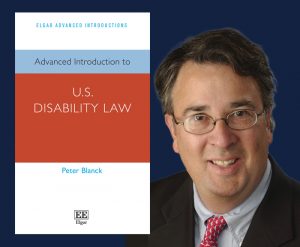 Advanced Introduction to U.S. Disability Law provides a timely and accessible overview of disability law in the United States, focusing primarily on the Americans with Disabilities Act of 1990 (the ‘ADA’). Peter Blanck addresses the social and legislative history leading up to the development of the ADA; coverage and remedies under the ADA’s three main titles; some of the fundamental and recent cases informing the ADA’s interpretation; and current issues facing U.S. courts, law makers, and policy makers.
Advanced Introduction to U.S. Disability Law provides a timely and accessible overview of disability law in the United States, focusing primarily on the Americans with Disabilities Act of 1990 (the ‘ADA’). Peter Blanck addresses the social and legislative history leading up to the development of the ADA; coverage and remedies under the ADA’s three main titles; some of the fundamental and recent cases informing the ADA’s interpretation; and current issues facing U.S. courts, law makers, and policy makers.
Reviews
‘Peter Blanck’s Advanced Introduction to U.S. Disability Law is a comprehensive overview of the past, present, and future of American federal disability law and policy. Easily accessible, the volume draws on Blanck’s decades of teaching, researching, and advocating disability rights from a broad interdisciplinary perspective. It is a valuable resource for anyone interested in the field.’
– Michael Stein, Harvard University, US
– Michael Stein, Harvard University, US
‘A must-read for scholars and activists around the world interested in US disability law and policy. It combines a helpful comprehensive overview with fascinating deeper dives into specific topical issues and current challenges. Its accessible writing style, as well as its important content, make it a highly engaging and thought-provoking read.’
– Anna Lawson, University of Leeds, UK
– Anna Lawson, University of Leeds, UK
‘A tour de force by one of the masters of American disability law. The field was an American invention and is now a global challenge. Anyone interested in its past – and especially its future – will find this an indispensable tool to build on the foundations of US law to create a more inclusive future for the estimated 1 billion persons with disabilities in the world.’
– Gerard Quinn, UN Special Rapporteur on the rights of persons with disabilities
– Gerard Quinn, UN Special Rapporteur on the rights of persons with disabilities
‘Blanck’s work provides a comprehensive, yet easy to navigate, coverage of US disability law. It captures both the history of the law’s development and its forward trajectory.’
– Michael Waterstone, Loyola Marymount University, US
– Michael Waterstone, Loyola Marymount University, US